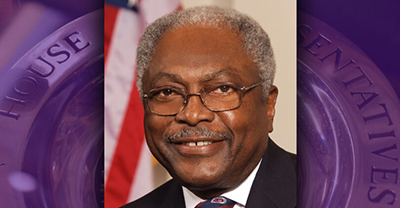By Congressman James E. Clyburn, House Majority Whip (D-SC)
I listened intently this morning as our 46th President Joe Biden and Vice President Kamala Harris addressed the nation from Statuary Hall observing the first anniversary of last year’s insurrection. I found myself reflecting upon the attack on Pearl Harbor that thrusted us into a world war against a tyrannical foreign power.
Eighty years later, tyranny is threatening America again, this time from a domestic attack. A President and his enablers created a narrative and fomented a “Big Lie” that is continuing. He incited a violent mob to attack our seat of government and disrupt the certification of the results of a free and fair election which he lost by over 7 million votes.
President Franklin Roosevelt referred to the December 7, 1941 Pearl Harbor attack as, “a day that will live in infamy.” World War II lasted almost 4 years. January 6, 2021 launched a disgraceful and ignoble domestic conflict, and it remains to be seen how long it will last.
Over the past year, we have witnessed loyalists of the 45th President work to unravel the threads that hold the fabric of our representative democracy together. His followers, fueled by a constant diet of disinformation, have harassed and intimidated election officials across the country, causing many to resign their positions out of fear for themselves and their families.
Republican officials, fearful of being primaried by “45’s” loyalists, embrace his “Big Lie” and enact legislation they feel will appease him. States with Republican governors and legislatures are passing laws and redistricting plans constructed to guarantee the election of more likeminded loyalists and shift government control away from anyone who doesn’t adhere to his tyrannical whims. According to the nonpartisan Brennan Center for Justice, 19 states have enacted 34 election laws that restrict or suppress the vote. Some to make it easier for local officials to nullify election results they don’t like.
The right to vote is the most fundamental thread of our democratic fabric. Without it, our democracy unravels. Currently, 50 Republicans in the United States Senate, aided and abetted by two Democrats, are blocking votes on two critical voting rights bills, the John R. Lewis Voting Rights Advancement Act and the Freedom to Vote Act.
The John R. Lewis Voting Rights Advancement Act basically updates the formula which, since the enactment of the 1965 Voters Rights Act, triggers a process of pre-clearance by the Justice Department or a federal court if a jurisdiction seeks to make any changes in its voting laws. In 2013, that pre-clearance formula was declared outdated by the United States Supreme Court and Congress was invited to update the formula.
The House responded by holding over a dozen hearings by two separate committees and passed subsequent legislation which was sent to the Senate. Unfortunately, all Senate Republicans, except Senator Lisa Murkowski, are standing in the way of its passage. Two Democrats have been giving comfort to the Republicans on this issue and one of them, Senator Joe Manchin, has proposed the Freedom to Vote Act, seeking to attract bipartisan support for many provisions of the House-passed For the People Act.
The legislation includes provisions protecting election security, reforming campaign finance, ensuring fair redistricting, and preventing voter nullification. Despite Senator Manchin’s mollification attempts, not a single Republican voted to allow the Freedom to Vote Act to come to the floor for a vote.
Senate Majority Leader Chuck Schumer has vowed to bring both bills up for another vote by January 17th, the Dr. Martin Luther King Jr. holiday. His efforts, however, seem destined to fail without a change to the Senate’s filibuster rules that require 60 votes to cut off debate.
While bipartisanship is welcomed, and may be preferable, history informs us that the 15th Amendment giving Blacks the right to vote, passed on a party line vote. And who would argue that the 15th Amendment should not have been adopted because it did not have bipartisan support?
I am not a fan of the filibuster. But, if holding on to that tradition is important to most of the Senate, I maintain that exceptions on Constitutional issues like voting should apply. An exception is employed for fiscal issues to ensure the full faith and credit of the United States are not jeopardized by a filibuster. The process is called “reconciliation,” a term I believe is more aptly applied to the Constitution than the budget.
On the day after the attack on Pearl Harbor, President Roosevelt spoke these words, “No matter how long it may take us to overcome this premeditated invasion, the American people in their righteous might will win.” He continued, “I assert that we will not only defend ourselves to the uttermost but will make it very certain that this form of treachery shall never again endanger us.” America was victorious. Our democracy and our friends and allies were saved from tyranny.
Today’s challenge is no less perilous. To dismiss the seriousness of this moment is to condone the insidiousness of the “Big Lie.” Our best protection is to ensure the fundamentals of our democracy hold. As our 16th President extolled during another challenging time, “a house divided against itself cannot stand.”
